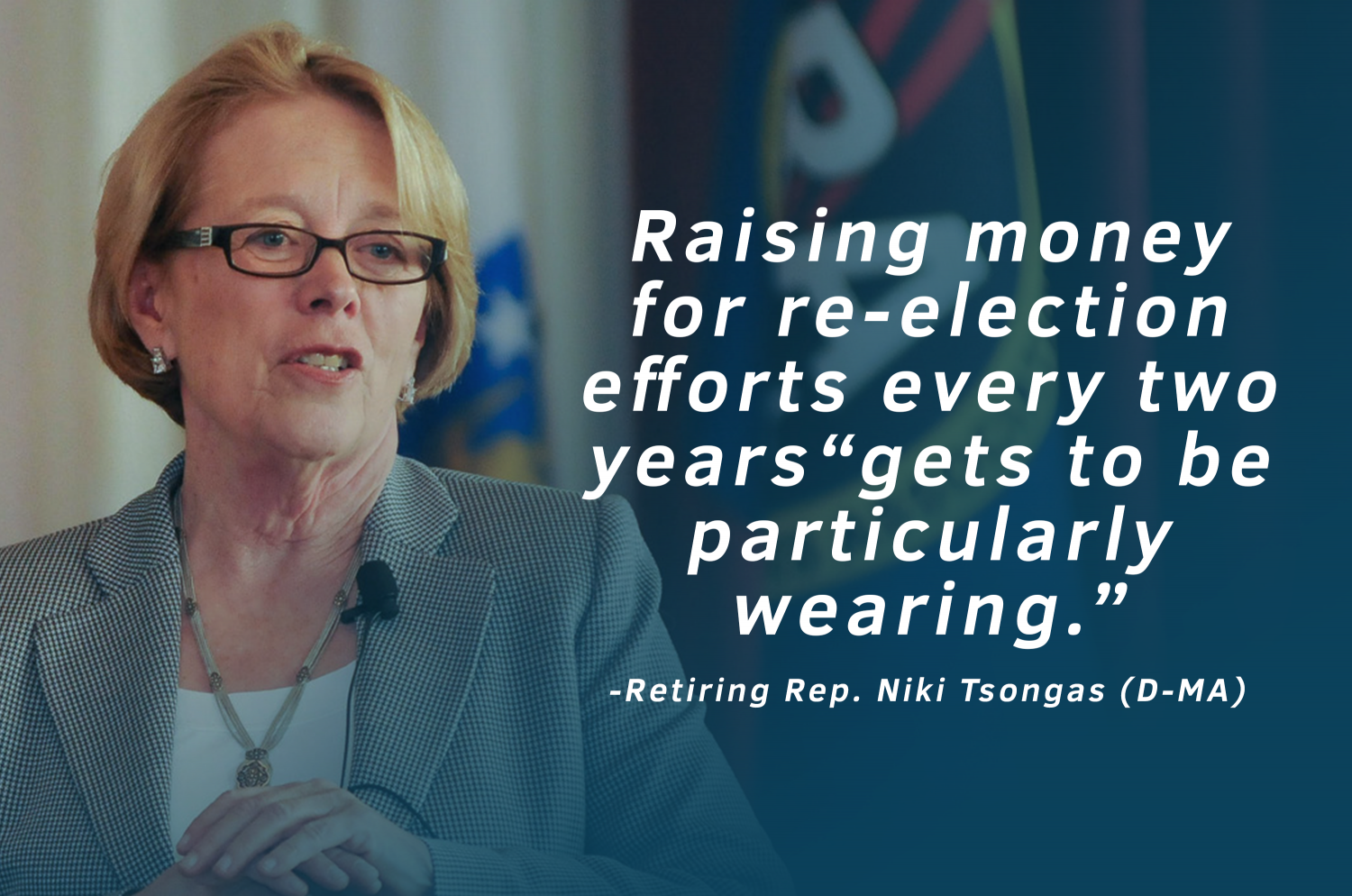Congresswoman Niki Tsongas (D-MA) was elected to the U.S. House of Representatives in a special election in October 2007. In August 2017, she announced that she would not be running for another term, saying she wanted to enjoy more time with her “wonderful and growing family.”
Tsongas first represented Massachusetts’ 5th Congressional District. She has represented Massachusetts’ 3rd Congressional District since the district lines were redrawn following the 2010 census.
In Congress, Tsongas has held a number of roles. She was the ranking Democratic member on the House Armed Services Committee’s subcommittee on tactical air and land forces during the 115th Congress and was the ranking Democratic member on the House Armed Services Committee’s subcommittee on oversight and investigations during the 113th Congress.
An alumna of Boston University’s law school, Tsongas started the first all-female law firm in Lowell, Massachusetts. Tsongas also worked as the dean of external affairs at Middlesex Community College and served on the Lowell Civic Stadium and Arena Commission prior to her career in Congress.
Her late husband, Paul Tsongas, was first elected to the U.S. House of Representatives in 1974. Paul Tsongas went on to serve two terms in the House and one term in the U.S. Senate, opting not to run for re-election in 1984.
The following are excerpts of an interview Issue One and the R Street Institute conducted with Tsongas for the “Why We Left Congress” project, a joint report about congressional dysfunction and what can be done to fix it, based on exit interviews with a bipartisan group of lawmakers who decided not to run for re-election in 2018.
On the fundraising pressure faced by congressional candidates:
Anybody who runs knows that we have to be willing to [raise money] even if there are times when we’d much rather be doing other things.
On raising money during her first congressional campaign:
When I first sought the seat, one of the first things I had to do was just test my willingness to focus on fundraising. I mean, it’s just something that is clearly part of the process … In 2007, and to an extent still today, the seriousness of your candidacy is often measured by your ability to raise funds. But I had never done it before … If I wanted to really be a competitive candidate, it was very important that I felt I could do it.
On raising money during the rest of her congressional career:
[I] certainly spent a good amount of time over my tenure in Congress having to [raise money] because I always faced a re-election effort. I mean, I never had a pass.
How fundraising pressures affected her early days in office:
When I first got there, when I really wanted to spend more time learning issues and just digging in, sometimes I couldn’t do it as much as I wanted, because there was the necessity to raise dollars.
On how lawmakers would spend their time if they didn’t have to fundraise as much:
I’m sure people would just have more time to dig in [to] the complexities of the issues that they’re having to vote on.
On the party dues system:
We want to be in the majority. And if raising dollars is important to helping support candidates out there that will bring us into the majority, I think those who are in positions of authority to be a ranking member of a particular committee, feel an extra obligation to do that.
On being an effective lawmaker:
There are countless opportunities to make a difference. And in the minority, it’s really a function of finding a partner across the aisle who will help you get it done.
On the importance of reaching across the aisle, whether in the majority or minority:
I came to Washington committed to reaching across the aisle. And so even though we were in the majority, I did that from day one. And I think then, when we lost the majority, those that I had reached out to were willing to reach back across the aisle.
On how the rhythm of life has changed for members of Congress since the 1970s:
The reality is we’re not in Washington as much as we once were, and I was under both regimes. So when my husband was in office, we moved to Washington. We had frequent opportunities to socialize with one another. In some instances, we all lived in the same neighborhood, so we shared day-to-day life, as you would back in your own district. You got to know people in a very different way. That’s just not possible now.
How the schedule operates now:
We arrive on a Monday night, and go to the floor to vote, and as soon as we’re done on a Thursday, we leave. So those opportunities [to socialize] are gone … It’s really born of the schedule that’s now in place. And I think if we were in Washington for longer weeks, that would bring more families there. But the downside of that is then you’re not back in your district as much. So I don’t think there’s any simple answer to this.
On the demonization of Congress by some of her colleagues:
Too often, we members of Congress demonize the institution we work so hard to become part of. I just think that feeds into the public narrative, in not a helpful way, around the House of Representatives … I had a consultant who wanted me to criticize Congress in my ad. I said, “I’m not going to criticize the institution I’m trying so hard to become a part of.” I honor it. Yes, it isn’t perfect, but nevertheless, it embodies who we are as a country.
One change she thinks would make Congress function better:
Many of our districts are drawn to be strongly partisan. It gives whoever’s elected from there very little leeway to compromise, to think a little differently. I think redistricting is one of the biggest challenges we have. To draw districts that aren’t so strongly tilted to one party or another.
Want to read more about this topic? Check out the full “Why We Left Congress” report, written by Marian Currinder of the R Street Institute and Michael Beckel and Amisa Ratliff of Issue One.







